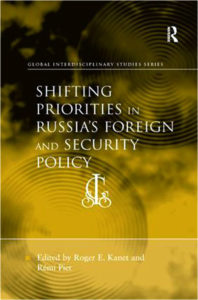
Shifting Priorities in Russia’s Foreign and Security Policy
Edited by Rémi Piet, Roger E. Kanet
Routledge (2014)
Rs10,653
Given the resurgence of Russian economic capabilities and of Russia’s role as a regional, even global, political actor, much of the literature written more than 4-5 years ago is already dated. The editor and contributors to this timely volume draw upon a broad range of analysts who deal with various aspects of Russian relations with its neighbours to the West and to the East. Implications for Russian foreign and security policy are key to understanding Russia’s position in the 21st Century. Readers in Russian foreign and security policy; European, Eurasian, and Asian security and contemporary international politics/security will find this volume invaluable.
’Bringing together a roster of authors who have an impressive record of collaborative work, some of the key issues in contemporary Russian foreign policy are analysed in this highly informative volume. Problems of identity formation, the effect of European Union enlargement on Russo-European relations, Russia’s turn to the East, the struggle to find a viable form of Eurasian integration, and the place of Central Asia in Sino-Russian relations are just some of the topics covered in this exceptionally readable and important volume.’ (Richard Sakwa, University of Kent, UK)
'Roger E. Kanet and Rémi Piet have assembled an excellent group of scholars to produce a comprehensive and judicious volume on Russia’s foreign policy, one that is notable for the attention it gives to the interplay between the internal and external sources of Russia’s perceptions of, and conduct in, the world.’ (Rajan Menon, City University of New York, USA)
‘… there is much in this book that is praiseworthy. … this volume is a welcome contribution to the literature and will be useful for policymakers as well as students of Russian foreign policy, post- Soviet politics, and international relations.’ (The Russian Review)
Roger E. Kanet is Professor in the Department of International Studies of the University of Miami, where he served as Dean of the School of International Studies 1997-2000. Prior to 1997, he taught at the University of Illinois at Urbana-Champaign, where he was a member of the Department of Political Science and served as Head of that Department, 1984-87, and as Associate Vice Chancellor for Academic Affairs and Director of International Programs and Studies (1989-97). He has authored more than two hundred scholarly articles and edited or coedited more than thirty books, primarily on issues of Soviet and Russian foreign and security policy.
Rémi Piet is an Assistant Professor of Public Policy in the Department of International Affairs at Qatar University in Doha. Previously, he served as Adjunct Professor at the University of Miami. He received his PhD in International Studies at the University of Miami, an MBA in International Management and an MA in International Relations from l’Université Laval (Canada), and a M.Sc. in International Economics from l’Université Paris La Sorbonne, France. His research interests include sustainable development, and American and European foreign policy. He is the author of several books and publications.
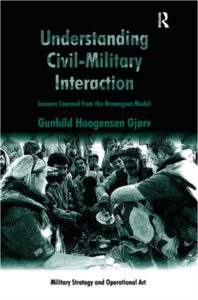
Understanding Civil-Military Interaction: Lessons Learned from the Norwegian Model
Gunhild Hoogensen Gjørv
Routledge (2014)
Rs9,834
A novel examination of civil-military interaction in particular between militaries and humanitarian actors, in light of the so-called ‘Norwegian model’ that espouses a clear divide between political and humanitarian (or military and civilian - the model is in fact unclear) actors, while maintaining a tight coordination between them. The Norwegian government has significantly reduced their own military’s capacity in the field of civil-military interaction, raising the question as to whether knowledge and skills in this field are necessary. Using a multi-actor security framework, this book examines whether or not the Norwegian government is correct in its assumptions (about both the model and civil-military knowledge amongst military personnel) and concludes that the Norwegian model is a well-meaning but inefficient and problematic model in reality. Although the case study focuses on Norway, the lessons learned are relevant to all nations engaged in civil-military operations.
Gunhild Hoogensen Gjørv is an Associate Professor at the University of Tromsø, Norway.
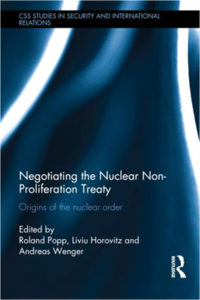
Negotiating the Nuclear Non-Proliferation Treaty: Origins of the Nuclear Order
Edited by Roland Popp, Liviu Horovitz, Andreas Wenger
Routledge (2017), Rs14,751
This volume offers a critical historical assessment of the negotiation of the Treaty on the Non-Proliferation of Nuclear Weapons (NPT) and of the origins of the nonproliferation regime.
The NPT has been signed by 190 states and was indefinitely extended in 1995, rendering it the most successful arms control treaty in history. Nevertheless, little is known about the motivations and strategic calculi of the various middle and small powers in regard to their ultimate decision to join the treaty despite its discriminatory nature. While the NPT continues to be central to current nonproliferation efforts, its underlying mechanisms remain under-researched. Based on newly declassified archival sources and using previously inaccessible evidence, the contributions in this volume examine the underlying rationales of the specific positions taken by various states during the NPT negotiations. Starting from a critical appraisal of our current knowledge of the genesis of the nonproliferation regime, contributors from diverse national and disciplinary backgrounds focus on both European and non-European states in order to enrich our understanding of how the global nuclear order came into being.
This book will be of much interest to students of nuclear proliferation, Cold War history, security studies and IR. The CSS Studies in Security and International Relations examines historical and contemporary aspects of security and conflict. The series provides a forum for new research based upon an expanded conception of security and will include monographs by the Center’s research staff and associated academic partners.
Roland Popp is a Senior Researcher at the Center for Security Studies, ETH Zurich.
Liviu Horovitz is a PhD Candidate at the Center for Security Studies, ETH Zurich.
Andreas Wenger is Director of the Center for Security Studies, ETH Zurich.
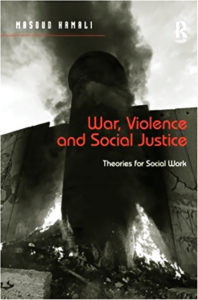
War, Violence and Social Justice: Theories for Social Work
Masoud Kamali
Routledge (2016)
Rs9,834
This book analyses the role of war and violence (in both its physical and symbolic forms) for social work in a time of neoliberal globalisation from a social justice perspective. It argues that the consequences of wars, in both their old and new forms, and the exercise of symbolic violence for the practices of social work at national and global levels have been ignored. This work explores the relationship between recent neoliberal and global transformations and their consequences for intensifying ’new wars’ and conflicts in non-Western countries on the one hand, and the increasing symbolic violence against marginalised people with immigrant and non-Western background in many Western countries, on the other. The analytical approach of the book, based on the theories of multiple modernities and symbolic violence, is unique since no other work has applied such theoretical perspectives for analysing inequalities in relation to the condition of lives of non-Western people living in Western and non-Western countries. This is a necessary contribution for social work education and research since the discipline needs new theoretical perspectives to be able to meet the new challenges raised by recent global transformations and neoliberal globalisation.
Masoud Kamali is Professor of Social Work and Sociology at Mid Sweden University. He is the author of Racial Discrimination: Institutional Patterns and Politics (2008); Multiple Modernities: The Case of Iran and Turkey (2006); and Revolutionary Iran: Civil Society and State in the Modernization Process (1998).
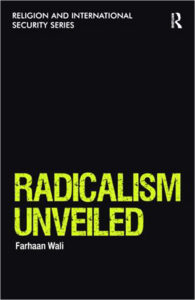
Radicalism Unveiled
Farhaan Wali
Routledge (2013)
Rs9,834
Radicalism Unveiled is an essential and unique contribution to our knowledge concerning the rise of Islamic radicalism in Britain. Through the study of Hizb ut-Tahrir (The Liberation Party), the spectre of radicalisation looms large and Muslim youth in Britain are increasingly linked to this group, making a critical examination of this complex phenomenon far overdue. Troubled by the great volume of disjointed theories put forward to provide an explanation for radicalisation, the author moves away from the preoccupation with working-class Muslims and considers the socio-political realities of this middle-class movement.
An expanding movement inspiring Muslims in Britain to turn away from the bedrock principles of this country and infusing them with religious fanaticism. By penetrating the clandestine veil of Islamic radicalism, the book is able to interpret and analyse the closed social world of radical activism. Relatively unchallenged within British society, Radicalism Unveiled has one key purpose: to determine and explain why some young Muslims join Hizb ut-Tahrir.
’An accessible and innovative study of the social world and ethos of Hizb ut-Tahrir in Britain. Critically evaluating the personal narratives of members - male and female - Wali identifies the radical pathways into the movement and its pattern of ideological indoctrination. The work is full of surprises, not least the extent to which it remains a middle class movement.’ (Philip Lewis, University of Bradford, UK)
’Wali offers a probing scholarly account that draws sensitively on his own experience of once being an Hizb ut-Tahrir insider, and succeeds in uncovering the complex roots of this controversial strand among British Muslims. Thanks to this study ordinary readers and policy makers alike now have a much better understanding of why and how Hizb ut-Tahrir has appealed to some British Muslims, as well as the range of motivations underpinning their support for it.’ (Humayun Ansari, Royal Holloway, University of London, UK)
‘This book fills an important gap in the academic literature on Hizb-ut-Tahrir (HT) in the United Kingdom. … As a former member of HT, Farhaan Wali’s access is excellent, as is his reflexivity about his own positionality within the research. … this is a significant contribution to knowledge and will appeal widely to scholars, students, and policy-makers.’ (Journal of Contemporary Religion)
Farhaan Wali is a specialist in the study of Islam and Muslims in Britain. He has held several highly esteemed lectureship and research posts in the field of Muslims in Britain. He is currently a Research Director for special projects at the Hansen Fisher Trust, where he oversees a number of cross-cultural research projects in the private and public sector related to counter-terrorism and British Muslims. He has gained a noticeable reputation as a scholar in the study of radical Islam. Farhaan Wali obtained his doctorate from Royal Holloway, University of London.

